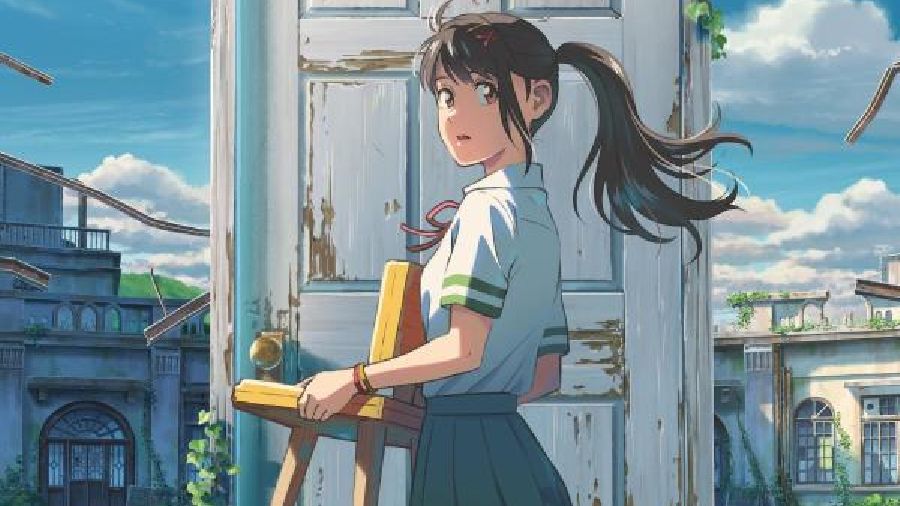Makoto Shinkai is often praised as a descendant of the great Hayao Miyazaki for his masterly animation, and his latest film, Suzume, is no exception. The film speaks the same cinematic language, employing an ethereal, emotive colour palette that enlivens every splash of water and blade of grass.
You can spot Miyazaki’s influence in more than just the visuals. There are familiar symbols and themes: The portal doors, the cursed male hero and a few narrative moves in the resolution all scream Miyazaki’s Howl’s Moving Castle, while the exploration of memory and grief mirrors his Spirited Away.
I’ll stop the Miyazaki comparisons there because Shinkai showcases plenty of his own narrative and directorial signatures in Suzume. He’s created a thoroughly modern world of both old and new forms of magic, of spells and old gods and of Instagram posts and texts. Like a locomotive chugging uphill, the story’s stakes are quickly raised to the scale of natural disasters and mythical phenomena, while Shinkai puts an emphasis on specific towns and regions in Japan, grounding us in the real world even as he whisks us away to other worlds.
What’s particularly exciting in Suzume is the story’s start. Seventeen-year-old Suzume wakes up from an otherworldly dream and heads off to school. On the way, she encounters and tries to follow a mysterious stranger named Souta but ends up in the ruins of an old resort, where she stumbles upon a free-standing door floating in a shallow bank of water. She opens it, and soon flaring wind, flying debris and massive red tendrils reach out and consume the darkening skies of Japan. This is only 10 minutes in. Shinkai doesn’t give you a chance to gauge your interest in its story; he immerses you immediately in the movie’s mythos and spells so that you have no choice but to offer your attention.
At the ruins, Suzume finds out she has unwittingly released a cute but troublesome cat-god that Souta calls the keystone, which caused the door to unleash a monstrous earthquake-causing beast beneath Japan. Souta is a “closer,” someone who finds and shuts doors to prevent such destruction — but the keystone has transformed him into a sentient three-legged chair to prevent him from completing his mission. Suzume must then help Souta in an odyssey across Japan, making new friends while the two race to stop a catastrophic equivalent to the 1923 Great Kanto Earthquake.
It’s not just the drama that works. Shinkai delivers hilarious physical comedy in the awkward gambols and leaps of Souta the three-legged chair — a refreshing reversal of the trope of the handsome young love interest who leads the naive girl on a journey. Shinkai is nothing if not a sentimental director, but here, instead of making the flirtation between Suzume and Souta the film’s emotional crux, thankfully he focuses on the relationship between Suzume and her mother, a nurse who died in the aftermath of an earthquake when Suzume was four.
Though the film does work as a metaphor for growth and loss, it never elaborates on the rules of its world, which detracts from the narrative. The film, like Shinkai’s last, Weathering With You, can’t decide if it wants to be an outright climate change parable or just a fictional story that references real climate disasters. Inspired by the 2011 Tohoku earthquake and tsunami, Suzume doesn’t fully square its mythology with those real environmental tragedies — or with humanity’s accountability in the inevitable monstrous acts of the natural world — and what this all means for the film’s plot and resolution. Unclear character motivations and murky magical logistics raise more questions than provide answers.
Which is what makes Suzume a fascinating, frustrating film. It doesn’t fulfil the promise it made in that truly stellar first act: to launch us into an adventure that crosses regions and planes but lands us steady back on our feet.










